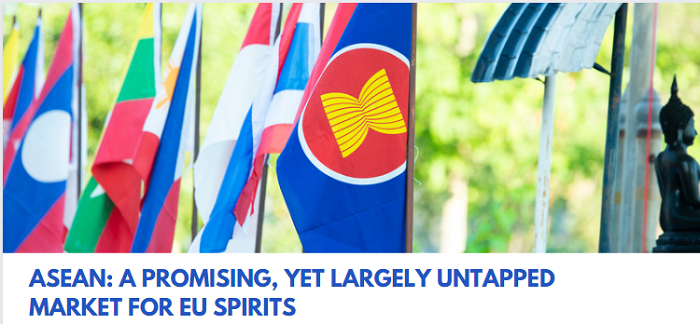
Later this week, EU & ASEAN leaders will gather in Brussels for a ‘commemorative summit’ to celebrate 45 years of diplomatic relations between the two blocks. The summit has been described by the EU as an opportunity to reconfirm both the EU's and its Member States' commitment to the EU-ASEAN strategic partnership, and an opportunity for both sides to build on their strategic partnership launched in 2020.
While the relationship with ASEAN is increasingly seen as strategic in the frame of the EU Indo-Pacific strategy and rising geopolitical tensions, let’s not forget that ASEAN is also a rising economic power and should be seen as a key economic & trade partner by the EU. With a population of over 655.5 million inhabitants, the ASEAN Region is expected to become the world’s 4th largest economy and the 3rd most populous by 2030. Opportunities for trade are evident, but still largely untapped – and spirits make no exception. At a time when we collectively face multiple challenges at global level & growing economic and geopolitical uncertainty, seizing these opportunities is a must to help the EU economy & trade flows diversify & increase our collective resilience. It is therefore essential to use the opportunity of the forthcoming summit to give fresh impetus to this strategically important relationship and to adopt a new trade strategy towards ASEAN to support industry’s ongoing diversification efforts. In return, the EU has a lot to offer, from its large internal market to reinforced partnership in a wide range of areas.
For spirits specifically, there are still significant untapped trade opportunities in the region. Singapore (mainly as a regional hub) and the Philippines are already part of EU spirits’ top 10 export destinations, thanks to no or relatively low tariffs, and present further growth potential. Other markets, such as Malaysia, Thailand and Indonesia, are promising, but the combination of high tariffs and taxation – which fuels illicit trade -, tax discrimination, restrictive national alcohol policies and difficult regulatory environments has prevented European companies from tapping their potential.
In order to harness the growth potential and export opportunities in Southeast Asia we call on the EU to follow a three-pronged approach and:
This week will also mark the first round of negotiations between the EU & Indonesia since November 2021. With a population of 276 million and a GDP of 1.19 trillion USD, Indonesia is the largest country and economy in the region. However, in spite of its evident potential, Indonesia has been a difficult country to access for spirits exporters, not least due to the import tariff of 150% on imported spirits. It is important to accelerate the pace of negotiations with Indonesia, in line with the EU-Indonesia joint pledge to accelerate negotiations made in the margins of the recent G20 trade ministerial meeting. The Summit and the presence of ASEAN leaders in Brussels also provide the EU with the opportunity to restart negotiations with other ASEAN countries. Malaysia is a key EU spirits’ priority in the region for a trade agreement, due to a combination of high barriers, good penetration of EU spirits and looming competition with international competitors from CPTPP countries, who benefit from preferential tariffs following Malaysia’s accession to CPTPP. We urge the EU to restart FTA negotiations with Malaysia to restore the level playing field between EU spirits & their international competitors. Thailand and the Philippines should not be neglected either as the broader ASEAN strategy gets translated into renewed impetus for a more active & open bi-lateral trade agenda.
Regulatory cooperation should be the second pillar of this new EU-ASEAN trade strategy, to address existing obstacles and prevent market access issues from arising. It should be seen as a priority whether or not negotiations are ongoing. Last but not least, the EU & ASEAN should work jointly to tackle illicit trade, which presents a triple threat to public health, economic growth and public finances – and in turn, to the realisation of the SDGs. With over €8.5 billion in fiscal revenue lost every year due to illicit alcohol at global level (over €1 Billion for ASEAN alone), there is a pressing need to address this issue, which has become even more prevalent during the pandemic. The EU & ASEAN have a shared interest in joining forces to reverse these negative trends – starting with the formal recognition of the fight against illicit trade as a priority for the ASEAN-EU Dialogue on Sustainable Development and the conclusion of a joint agreement or MoU on illicit trade. More detailed recommendations feature in our strategy paper. We hope the Summit will generate the momentum needed to turn these ideas into reality – and to boost our already critical economic & trade relationship with ASEAN & ASEAN countries.